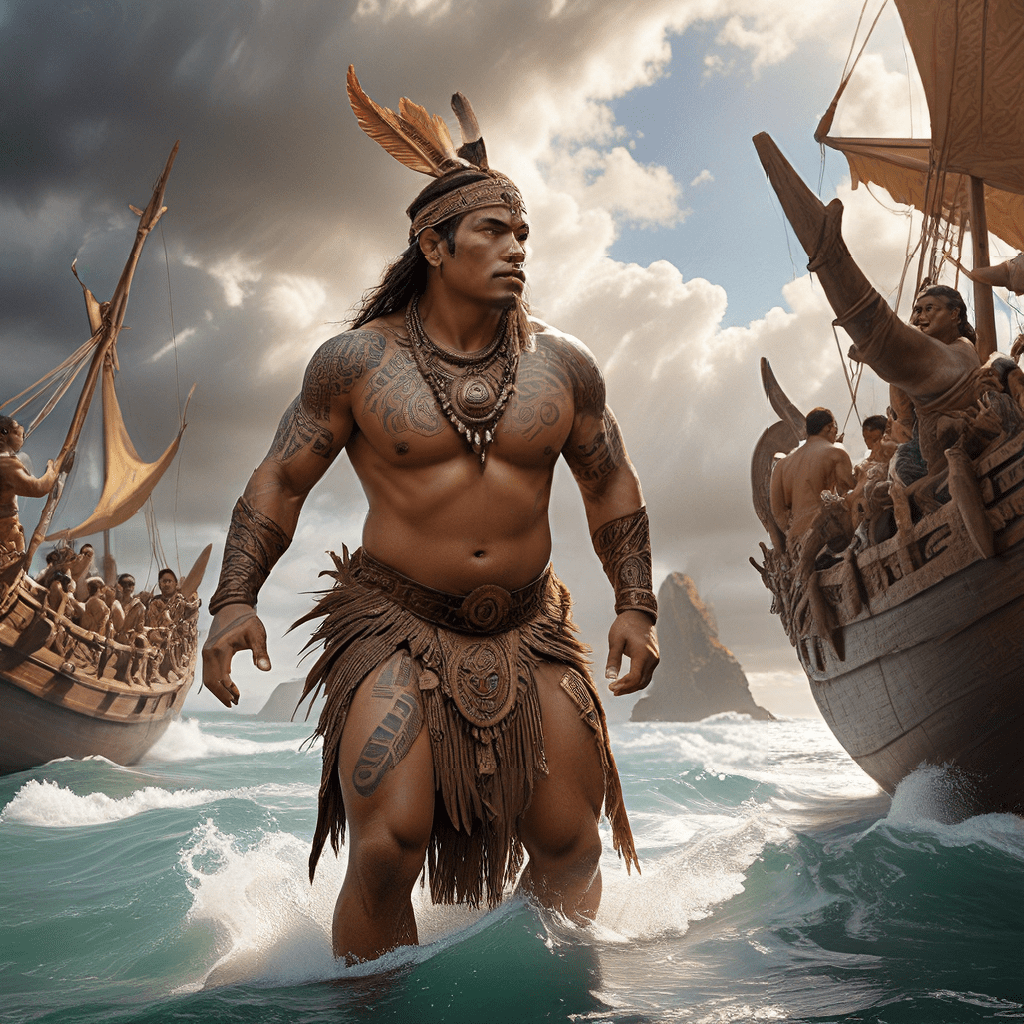The Dragon King of the Eastern Sea: A Guardian of Korean Waters
In the rich tapestry of Korean mythology, a majestic and powerful figure reigns over the vast expanse of the Eastern Sea: the Dragon King. This mythical creature, known as "Yongwang" in Korean, is not just a legend but a deeply ingrained symbol of the ocean's power, mystery, and vital connection to life on land. The Dragon King embodies the awe-inspiring force of nature and holds sway over the waters that sustain Korean culture and folklore. From ancient tales passed down through generations to modern representations in art and literature, the Dragon King remains a captivating figure, blending elements of the mythical with the practical, and the spiritual with the earthly.
The Dragon King’s Origins in Korean Mythology
The Dragon King's roots lie deep within Korean mythology, dating back to ancient times. His emergence as a prominent figure can be traced to the convergence of indigenous beliefs with influences from neighboring cultures. Early Korean myths often depicted dragons as powerful beings associated with rain, storms, and the cyclical nature of the natural world. The Chinese influence, with its concept of the Four Heavenly Kings, each representing a cardinal direction, likely played a role in shaping the Dragon King's character and role. The Dragon King's association with the Eastern Sea resonated with the maritime culture of Korea, where the ocean held immense significance for livelihoods, transportation, and belief systems.
The Dragon King’s Palace: The Underwater Realm of Yonggung
The Dragon King's abode, the magnificent underwater palace known as Yonggung, is a testament to his power and stature. This mythical realm, often described as an intricate and dazzling city of coral, pearls, and jade, reflects the Dragon King's dominion over the ocean's riches. Yonggung is said to be a place of wonder, where mermaids dance, magical creatures roam, and treasures beyond imagination are kept. In Korean folklore, the Dragon King's palace is not merely a physical location but a symbol of the ocean's hidden depths, a realm where human imagination meets the natural world's mysteries.
The Dragon King’s Powers and Influence
The Dragon King's powers are vast and encompass the very forces of nature. He controls the tides, summons storms, and commands the creatures of the deep. His influence extends not only over the ocean but also onto the land, influencing weather patterns, the fertility of crops, and even the fate of human beings. From ancient times, Koreans sought the Dragon King's favor, praying for good harvests, safe voyages, and protection against the elements. The Dragon King's power was both revered and feared, a reminder of the unpredictable nature of the ocean and the importance of respecting its power.
The Dragon King’s Role in Korean Folktales and Legends
The Dragon King is a central figure in countless Korean folktales and legends. He is depicted as both a benevolent ruler and a formidable force, depending on the narrative. In some stories, he aids humans in distress, granting wishes or lending his assistance. In others, he acts as a guardian, protecting the seas from harm or testing the resolve of those who dare to challenge his authority. These tales serve not only to entertain but also to teach valuable lessons about human nature, the interconnectedness of life, and the importance of respecting the natural world.
The Dragon King’s Symbolism: A Representation of Power and Nature
The Dragon King's representation extends beyond a simple mythical figure. He embodies the awe-inspiring power and mystery of the ocean, reflecting the deep connection between humanity and the natural world. His form, often depicted as a serpentine dragon with powerful claws and whiskers, represents the strength and agility of aquatic creatures. The Dragon King's ability to control the tides and weather reflects the unpredictable nature of the ocean, reminding people of the need to respect its power and unpredictable forces. He serves as a reminder that even the most powerful beings are subject to the laws of nature, illustrating the interconnectedness of life on land and sea.
The Dragon King’s Connection to Buddhism and Confucianism
The Dragon King's influence in Korean culture extends beyond folklore and mythology. He also plays a significant role in Buddhist and Confucian beliefs. In Buddhism, the Dragon King is often associated with the concept of "karma," where actions have consequences, and the ocean's unpredictable nature serves as a metaphor for the impermanence of life. Confucianism, with its emphasis on social order and harmony, found resonance in the Dragon King's role as a ruler. The Dragon King's ability to maintain order in the underwater realm reflects the Confucian ideal of a just and benevolent leader. These philosophical influences further deepen the Dragon King's symbolic significance, connecting him to the spiritual and ethical foundations of Korean culture.
The Dragon King’s Evolution Over Time
The Dragon King's image and role have evolved over centuries, adapting to changing cultural contexts. From early depictions as a fearsome and unpredictable force, the Dragon King gradually transformed into a more benevolent and protective figure. This shift can be attributed to the growing influence of Buddhism and Confucianism, promoting values of compassion and harmony. Additionally, as Korean society became more urbanized, the Dragon King's association with the ocean shifted from a source of fear to a source of wonder and fascination. These transformations reflect the evolving relationship between humans and the natural world, showcasing the Dragon King's enduring relevance as a symbol of the ocean's power and mystery.
Theories on the Real-World Inspiration for the Dragon King
While the Dragon King is a mythical being, there are theories suggesting that real-world phenomena might have inspired his creation. Some believe that the Dragon King's image might have originated from sightings of large marine creatures, such as whales or giant squid, which were often seen as mythical or supernatural beings in ancient times. Others suggest that the Dragon King's association with rain and weather could be linked to the phenomenon of monsoons, which heavily influence Korea's climate and agriculture. These theories highlight the close relationship between ancient mythologies and the natural world, suggesting that folklore often draws inspiration from the mysteries and wonders of the real world.
The Dragon King’s Modern Legacy in Korean Culture
The Dragon King's legacy continues to be felt in modern Korean culture. His image appears in art, literature, film, and even popular music. From traditional paintings depicting the Dragon King's grand palace to contemporary animations showcasing his mythical adventures, the Dragon King remains a beloved symbol of Korean heritage. His presence in popular culture reflects the enduring appeal of the mythical and the ocean's enduring power to inspire awe and wonder. Furthermore, the Dragon King's enduring presence in Korean culture serves as a reminder of the deep connection between humanity and the natural world, a connection that continues to influence art, folklore, and the very essence of Korean identity.
FAQ
Q: What is the Dragon King's role in Korean mythology?
A: The Dragon King is a powerful mythical creature who rules over the Eastern Sea in Korean mythology. He controls the tides, weather, and the creatures of the deep, influencing both the ocean and the land. He is depicted in countless folktales and legends as both a benevolent ruler and a formidable force, showcasing the awe-inspiring power of the natural world.
Q: What is the Dragon King's palace like?
A: The Dragon King's palace, known as Yonggung, is a magnificent underwater city of coral, pearls, and jade. It is often described as a place of wonder and beauty, where mermaids dance, magical creatures roam, and treasures beyond imagination are kept.
Q: What does the Dragon King symbolize?
**A: ** The Dragon King embodies the power and mystery of the ocean, representing the interconnectedness of life on land and sea. His image reflects the need for respect and reverence towards the natural world, reminding us of its unpredictable nature.
Q: How is the Dragon King connected to Buddhism and Confucianism?
A: The Dragon King's role extends beyond folklore to Buddhist and Confucian beliefs. In Buddhism, he is associated with karma and the impermanence of life. Confucianism sees him as a just and benevolent ruler, reflecting the values of social order and harmony.
Q: What is the Dragon King's modern legacy?
A: The Dragon King continues to be a popular figure in modern Korean culture, appearing in art, literature, film, and music. His enduring presence showcases the power of mythology to inspire and connect with people across generations and reflects the deep connection between humanity and the natural world.



